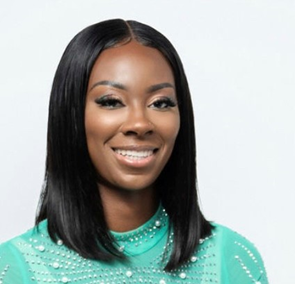Michelle Kimberly Clark’s Story

Michelle Kimberly Clark
Breast Cancer Survivor, Clinical Trials Patient Participant
In May of 2013, while exercising Michelle felt a small mass on her left breast. In 2015, she met Andre (her husband), starting her life as a young, vibrant, African American woman. They moved to Atlanta and as Michelle states, she was “on her way to living every girl’s dream of love, marriage, and then the baby in the baby carriage!” While showering she noticed that after two years the lump was still in her breast. She scheduled her annual physical, and unfortunately was told by her doctor not to worry about the lump; “You’re too young,” the doctor exclaimed!
In 2019 Michelle sought a second opinion by a new doctor who scheduled her for a mammogram and ultrasound. The COVID-19 pandemic hit and stalled her appointment for what has already been a long and unsettling process. In August 31, 2021, after completing a mammogram and ultrasound., at just 36 years old, Michelle was diagnosed with breast cancer in her left breast with a suspicious area on her right breast.
Michelle made the difficult decision to have double mastectomy surgery. On November 2, 2021, she froze seven (7) embryos and on January 2022 she entered a clinical trial, completing four rounds of intense chemotherapy. A component of her trial included the research team tracking neuropathy in African American women under treatment using the drug Taxane (docetaxel).
Michelle admits she was hesitant to participate in the clinical trial at first, because of the uncertainty and having a bit of selfishness for her own health. However, after voicing her concerns to her doctor and an amazing research nurse, she felt comfortable with being a part of a clinical trial that would allow her to discuss the effects of the treatment. Oftentimes, patients dealing with serious illness hear the words “clinical trial” and they feel reluctant to move forward. Michelle felt reassured this trial allowed her to feel confident in knowing that her experience would benefit more black women undergoing treatment for breast cancer in the future. From her participation in this trial, her research nurse, later became a part of her support group. Michelle believes that clinical trials are important because they allow medications and treatments to be effectively targeted for African American women.
The post Michelle Kimberly Clark’s Story appeared first on Georgia Bio.




